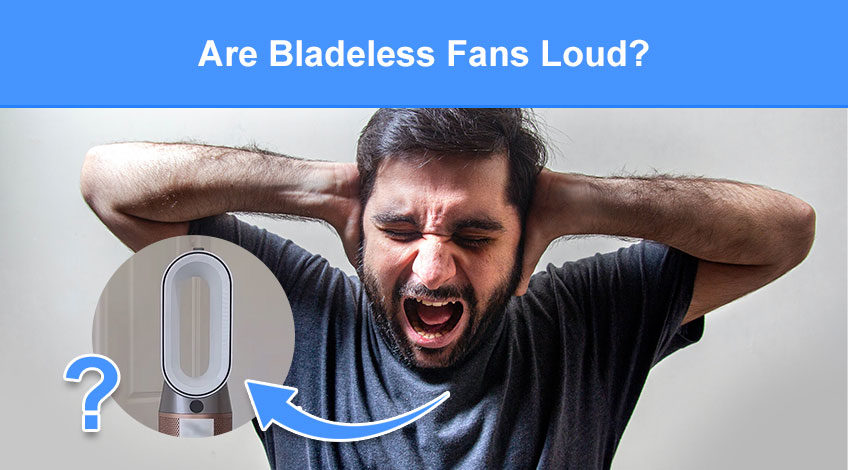
Are Bladeless Fans Loud? (are they quiet or do they make noise)
Bladeless fans have changed the world of indoor cooling devices. Their sleek, aesthetically pleasing design and bladeless air flow has captivated many homeowners.
But are bladeless fans loud? Keep reading to find out.
How Sound Is Measured?
Before we get into whether bladeless fans are loud or not, we need a guide to gauge the level of sound they produce. Sound is measured by decibels (dB) so let’s look at some everyday items and see their dB rating.
Common Sounds In Decibels
| Sound | Decibels (dB) |
|---|---|
| Whisper | 15 dB |
| Refrigerator | 45 dB |
| Normal Conversation | 60 dB |
| Ringing Telephone | 80 dB |
| Loud Shout | 85 dB |
| Hair Dryer | 90 dB |
| Chain Saw | 108 dB |
| Hammer Drill | 114 dB |
| Ambulance Siren | 120 dB |
| Jet Engine | 140 dB |
| Rocket Launch | 180 dB |
The above chart shows some common sounds and their sound level in decibels. This will allow you some point of reference when we start talking about the noise levels of bladeless fans.
How Quiet Are Bladeless Fans?
Bladeless fans are marketed as being far quieter than their bladed counterparts. So let’s look at the actual figures which were stated by Dyson for their bladeless fans.
Dyson says that their fans have a sound of 37 decibels when running on the lowest setting and a sound of 57 decibels when running on the highest setting.
So this means Dyson bladeless fans are quieter than a fridge on their lowest setting and on their highest setting the decibel level is just below a normal conversation.
Below is a video of a Dyson AM06 desk fan which demonstrates the sound levels on each setting.
How Noisy Are Bladed Fans?
Regular bladed fans range in loudness from 30 to 70 decibels depending on the model. This would mean the quietest bladed fan would be twice as loud as a whisper. While the loudest will sound somewhere between a normal conversation and an argument.
Desk fans tend to be generally at the lower end of the decibel level with floor fans being louder and ceiling fans louder still.
Dyson Reduced Sound Levels By 75%
Since they first developed their bladeless fans, Dyson have worked hard to reduce noise levels on their products. They dismantled their bladeless fans and looked at every part to see if improvements on noise levels could be found.
After much trial and error, they discovered that a 75% reduction in noise could be achieved by employing the Helmholtz cavity principle[1] which meant changing the shape of the motor and fan housing.
SEE ALSO: Are Bladeless Fans Better Than Regular Fans? (pros & cons)
Not All Bladeless Fans Are The Same
Other companies claim their bladeless fans are running at only 13 decibels, but with no actual tests to substantiate these claims we have to conclude they are false.
However there are many reviews that state that some of the cheaper bladeless fans are much quieter than many bladed fans. So all we can say is do your homework and look around before you buy.
Why Are Bladeless Fans Quieter Than Bladed Fans?
Bladeless fans are quieter than their bladed counterparts because there is no sound from large blades turning on a bladeless fan.
This is because the fans that drive a bladeless fan are contained inside the pedestal and are much smaller.
Then there’s that whooshing sound that comes with a bladed fan caused by the air being pushed by the blades through the metal cage that protects the fan blades on bladed fans.
Over time, that metal cage can become loose which creates an added rattle to the noise.
Plus bladeless fans have very few moving parts and those that it does have are hidden inside the pedestal.
How Does A Dyson Bladeless Fan Work?
Below is a video of Sir James Dyson explaining just how his bladeless fans work.
The air is drawn in through the grilled panels which are situated all around the base of the fan. That air is then forced over a blade that is shaped like an aeroplane wing.
It is then funnelled up towards the ring at the top where it is released. The breeze from the fan picks up more air from around the ring on its way out.
This increases the air flow by up to 16 times as much as was drawn in at the base. Which is why Dyson now calls their bladeless fans “air multipliers”.
Are Dyson Bladeless Fans The Best?
This is like asking a car owner whether a Mercedes is better than a Kia. When it comes to bladeless fans, Dyson is up at the top of most lists for various reasons.
But there are plenty of far lower priced bladeless fans that will keep you as cool in hot weather as a Dyson. In just the same way that a Kia will get you to the same places that a Mercedes will.
In other words, there are many bladeless fans on the market that are still quieter than bladed fans, and will work just as well to keep you cool. Some even have HEPA filters to remove dust, pollen and other allergens.
The question is do you want a Mercedes or a Kia?
SEE ALSO: Our Picks For The Greatest Bladeless Fans You Can Get For Your Money
Frequently Asked Questions
Bladeless fans are generally quieter than regular fans. Mainly because the fan is contained within the pedestal so you don’t get that whooshing sound as the fan forces air through the protective cage found on regular fans.
Bladeless fans tend to be less noisy than regular fans overall. However it depends on many factors; make, model, setting and size all contribute to noise production. But as bladeless fans have no visible moving parts and no metal cage for air to pass through they tend to be less noisy than bladed fans.
The Dyson bladeless fan can reach 57 decibels when running at the highest setting. But can be as low as 37 decibels when running on the lowest setting. This is comparable or slightly better than a regular fan.
No fans are completely silent but Dyson bladeless fans can come pretty close if used on the lowest power setting.
Also, follow us on Pinterest ...



